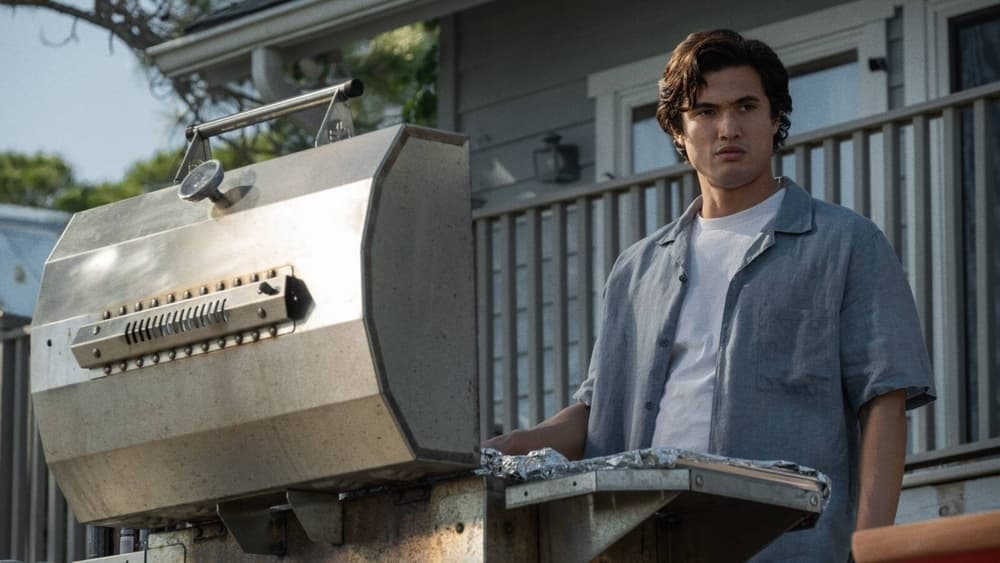Since releasing wide on Netflix this past weekend, Todd Haynes’s new film “May December” has generated diverse reactions from audiences — from praise for its partly hilarious, campy tone to sickness at its subject matter to uncomfortable confusion. But despite the wide-ranging opinions, a consensus seems to be forming that Charles Melton’s performance as Joe is one of the best aspects of the film and should see him picking up a ton of Oscar buzz as awards season kicks into gear — he’s already won Best Supporting Actor at the Gotham Awards and the New York Film Critics Circle Awards. It’s quite the unexpected turn from the former “Riverdale” star. While the pipeline from teen melodrama to Oscar-nominated performance is not without precedent — see Michelle Williams post-“Dawson’s Creek” — it still feels like Melton is coming out of nowhere with a complex take on a messy character and narrative.
The decision to cast Melton in the first place is already a stroke of genius. The character Melton’s required to play is a 36-year-old man who never emotionally grew past the age of 13 because of the trauma Joe suffered as a young boy when he was raped by Gracie — even if he insists for most of the film that he wanted it to happen. Though Melton is over 30 himself, he has a very young face. He doesn’t necessarily look like a teenager, but he looks far closer in age to Joe’s children than he does Gracie. On top of that, those who know that he was on a teen TV show will associate him with youth — even though they apparently play adults on “Riverdale,” what a strange show — and the state of arrested development that comes with being a 30-year-old on a show aimed at teenagers is reflected in his character. But while Melton’s casting alone can get him part of the way to playing this complex part, the performance itself does the heavy lifting.
The primary way Melton gets across that this is a boy in a man’s body is through his physicality, specifically his acute mannerisms and how he carries himself. Joe is a timid person and, despite his size (both in height and weight) overwhelming both Gracie and Elizabeth, he must look and feel small next to them. Casting helps again here, as the talents of Julianne Moore and Natalie Portman and their over-the-top performances force Melton into himself. He leans over rather than standing tall. His arms and hands are either around Gracie or folded and held close to his body. Melton also uses his eyes brilliantly, and it feels like he’s always looking at or for Gracie, seeking her approval, or watching out for her and trying to sneak around.
Melton’s delivery suggests a man who doesn’t and has never felt comfortable with himself. He speaks with a low, monotone voice, never feeling comfortable enough around Gracie to raise his voice and potentially challenge her control over him. There’s a tension in this way of speaking that conveys a fraught internality that inevitably bursts. When it finally does, it feels like Melton is overextending, trying to reach for emotions he has never hit as an actor before and hold his own against Moore and Portman. But this works perfectly for the character. Joe hasn’t confronted these emotions head-on before, and making them explicit is as difficult for him as a person as it is for Melton as an actor. It’s messy and raw, and it cuts deep because we so desperately want to see Joe make a meaningful connection that doesn’t stem from someone exploiting him. We get this in the scene where Joe smokes weed on the roof with his son. He completely breaks down, his walls breached, and more than any other moment in the film, this is where he is finally ready to confront the horrible things that have happened to him in his life.
I don’t know if Melton is going to threaten at the Oscars in March or even if he should take home the Best Supporting Actor trophy at all — Robert De Niro in “Killers of the Flower Moon” still is the best eligible performance in my opinion — but he certainly gives one of the best and most unexpected performances of the year. Perhaps if more of these clearly talented TV actors took a stab at challenging roles in films made by masterful filmmakers — as we are now seeing with the likes of Jacob Elordi — we wouldn’t be as surprised when we get a performance as good as Melton’s in “May December.”

